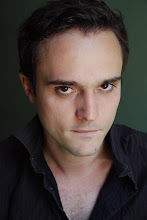Plot: A seedy character tries to exploit a benign old man who gives people exactly what they need with his powers of foresight. When he asks for too much, he meets a violent end.

If it sounds like a simple premise, that's because it is. The Twilight Zone Companion glazes over this episode, citing "lackluster direction and performances" as the issues it suffers from. The original story from which Serling adapted it had the psychic old man as a scientist who invents a machine that shows possible futures for individuals. He then provides objects for the individuals that will guide them towards the best possible future.
... come to think of it, this reminds me of the Philip K. Dick story Paycheck, which they made into a Ben Affleck movie. Damn, this is the second time in 12 episodes that it feels like PKD ripped off Twilight Zone. I hope it wasn't intentional.
Back to the point, I'm glad that Serling decided to go with a paranormal explanation to the old man's foresight as opposed to a pseudo-scientific one. Mysticism trumps fake science in most cases of fiction, and the paranormal has been described as "science that we don't understand... yet."
In my rarely humble opinion, the problem with this episode wasn't the direction or acting, but the screenplay itself. I thought the two main actors were terrific, considering the basic lack of compelling dialogue and character development present. As I watch these episodes again for the first time in years and really consider them, I'm finding myself less and less impressed with Serling's material. (I only hope that some Serling devotee doesn't toss a brick through my window for that comment.) My hands-down favorite episode so far was from a Beaumont script. Still, it's early in the game; Serling hasn't even been on camera yet!

After the show's first week of absence (probably for a holiday special), this episode aired on Christmas day, 1959. While not explicitly seasonally themed, I couldn't ignore the element of gift giving and the score that plays throughout that seems to take something from God Rest Ye Merry Gentlemen. Something else that occurred to me was that the bar in the first scene was the same set from the previous episode, with a few cosmetic changes. I'm sure we'll be noticing a lot more reused sets going forward.
That wraps it up for 1959! It's been a blast watching The Twilight Zone week-by-week, "the way it was meant to be seen." Enjoy SyFy's New Year's Marathon, and join me next week as we boldly step into the 1960's!







